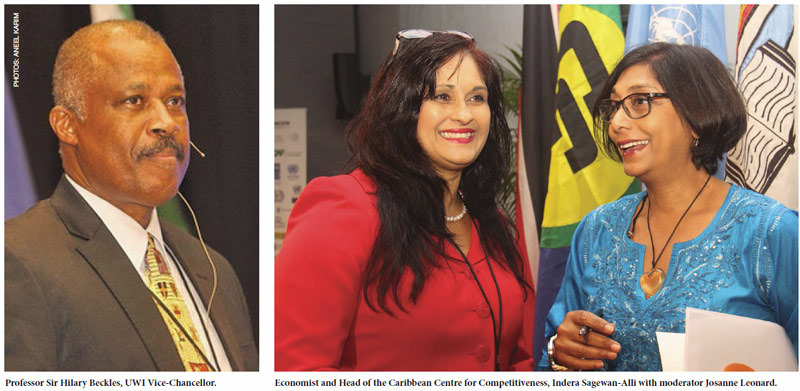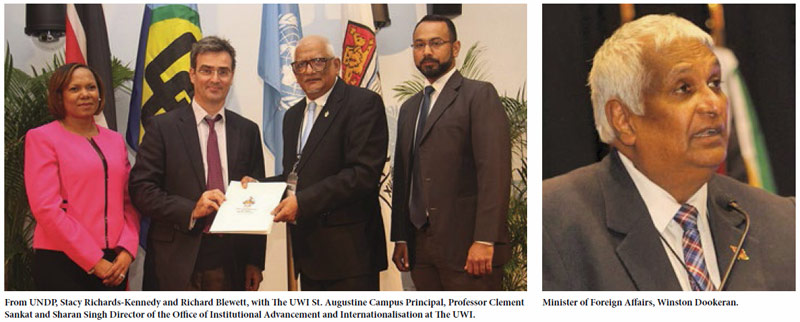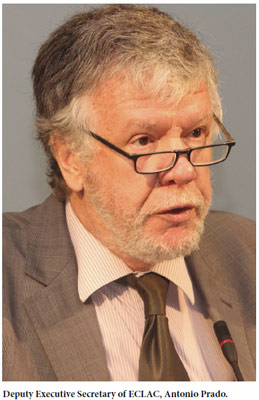
There is no doubt that the content of this conference is absolutely essential to the future of the Caribbean region. The challenge is therefore not in the conception of ideas, but in the more up-stream department of executing ideas. Pro Vice-Chancellor and St. Augustine Campus Principal, Professor Clement Sankat, in his opening remarks underscored this point by saying that as a region, country and community, “execution has bedeviled us.”
Shortly thereafter, the Deputy Executive Secretary of ECLAC (Economic Commission for Latin America and the Caribbean), Antonio Prado, brought what could have been easily summative and future-positioning remarks in his welcome. Prado said that the models and strategies used to improve the lives of the peoples in the past are no longer working, that small adjustments have not been enough in a hyper-competitive world and there needs to be a tectonic shift, a paradigm change.
Luke Williams’ Disrupt was the provocateur concept for this conference and Prado’s address exemplified and advanced a real-time meaning of being disruptive in the Caribbean with razor accuracy. He said that disruptiveness in the region is needed to challenge the persistent problems associated with development and some revolutionary ways of bringing this would be for:
(1) Institutions to strengthen a culture of openness with the public at large as they are the groups who make the products, provide the services and craft the experiences. A robust collaborative relationship with the private sector would challenge academics to find practical solutions from their theoretical positions so that the intersection of that relationship is the genesis of disruptiveness.
(2) Academics need to revise what and how they theorize and conceptualize and leave behind macro-thinking for a deeper level, a micro-level of understanding that can drive innovation and profitability in business, which can be supplied to business to help them leap-frog over past and known challenges to development.
(3) Business and industry must share in the risks associated with research and development which will benefit all. Only networks of public and private partnerships can find ways to raise productivity levels, cut the lengths between growth and inequality and spread the access to capacity building tools. Overall, the region has to use these “ideas as recipes to rearrange things to create new value and wealth” – the core tenet of Luke Williams’ Disrupt as based on economist Paul Romer’s new growth theory.
This frame was adequately clad with some specifics, statistics and samples over the course of the three days but it was on the last day, at almost the last session that arguably, one of the most important drivers of disruptiveness was presented: CARICOM has to reinvent itself. This call came from Andy Knight, Director of the Institute of International Relations at The UWI.

“CARICOM is an important institution for Caribbean unity but there is a perception that it has stalled or lost its way. It is not enough to tinker with that institution it requires a complete overhaul.
“Caribbean states are small, vulnerable and dysfunctional. Pursuing individualistic foreign policy will be a failure. We need to act as one, to pool our sovereignty, to get rid of the egotistical political leadership and forge a new convergence in terms of collective decision-making and positions within multilateral bodies.”
Caribbean people, by their sheer enduring presence are creative, adaptable overcomers, but there is a time in the personal and collective histories of all people when the survival strategy of ‘brute force’ must be examined and tweaked, if not totally revamped to survival predicated on ‘brain power.’ And that is what this conference was about – acknowledging that the future of the Caribbean lies in using the accumulated intelligence along with the better than ever access to technology, to find a way to make the data meaningful in everyday life.
That is a big request and indeed a major disruption to the current order as every speaker no matter the subject, in some form acknowledged that the ideas and perspectives they were offering in some way challenge the current order and modus operandi. Speakers therefore adequately aligned to the conference themes: laying out futuristic goals for the region; reviewing how the Caribbean collective can converge; calling for the region’s debt burden to be lessened; addressing poverty and other social imbalances; locating innovative financing and finding allies for this drive in the global village.
Andy Knight summarized some of the key issues on the last day:
“It is time to streamline the plethora of regional organizations that have multiplied in the region since independence. Rationalization of their goals and functions and elimination of unnecessary overlap would be part of that streamlining. We need political leadership, but a different type of political leadership than we have currently. Corruption, white-colour crime, unaccountability must give way to clean and accountable governance.”
To effect change in poverty levels, social inequalities, Caribbean integration, climate change, in SIDS (Small Island Developing States) another speaker, Kahlil Hassanali from the Institute of Marine Affairs pointed to the gap between rhetoric and action that in every facet of life, is faced by every country in the region.
“We are signing up to many treaties but lack legislation to bring life to these treaties in national policy and action,” he said.
Concluding Day One, Shariann Henry reiterated, “We need equality for all, equal work for equal pay… The 2014 public corruption perception index ranks T&T at 85 and Jamaica is close to that number too – the trickle-down effect will never occur. We need long term approaches to deal with corruption.”

The essential messages emerging over the days were that people at every corner of the Caribbean are thoroughly fed-up with governments fighting racial or tribal wars, politicking with national resources, misappropriating funds and acting in corrupt and nepotistic ways that further undermine the archaic systems and processes that seem never to work for and are always against people’s prosperity; that collectively the people of the region are disgusted and disappointed with where the Caribbean is developmentally and relative to the rest of the world and that the region needs to hurry up and get on the path to a better existence for not select strata of societies, but for all.
The UWI’s Vice-Chancellor, Professor Sir Hilary Beckles, in his opening statement on the second day said, “We all know what we want. We wish to see the Caribbean world develop its materials and infrastructure more aggressively. We wish to see systems of governance and political relations rooted in the Caribbean revolutionary philosophy of justice for all and freedom for all. We wish for cultural dynamism, cultural tolerance and respect. All of this is a part of the Caribbean revolution.”
In locating the historical Caribbean within a revolutionary mindset, he urged that there be a resurrection of that spirit if any change were to be effective.
For a conference whose content description is as bold as ‘disruptive’ to the status quo, the question really is: how does disruptive thinking render to progressive outcomes?
It can be argued that the practical operations of disruptiveness came from the audience. Throughout the three days, comments and questions centered on these points:
we cannot really be disruptive if all the ideas we are discussing are based on Eurocentric beliefs, paradigms and measurements, none or few new ideas move away from this way of thinking and perspectives on the region;
that as a region we are lacking cultural confidence in our own traditions and abilities to respond to global developments;
when we talk about ‘sustainable development,’ whose sustainable development are we really talking about, as social justice and gender inequality are still not on anyone’s agenda and the top-down approach to mapping, fixing and engaging Caribbean people is not working but is still being done – take this conference for example – where are the voices of the youth, of civil society, of stakeholders and community leaders?
The peeping cynicism of day one was left behind on days two and three where cynicism became rife among attendees who shared their opinions.
 “The usual Caribbean talk-shop” was the spin put on the sessions, as people seem to be simply frustrated that the issues around non-performing or under-performing governments cripple their efforts to bring change, bring a better quality of life. “The usual Caribbean talk-shop” was the spin put on the sessions, as people seem to be simply frustrated that the issues around non-performing or under-performing governments cripple their efforts to bring change, bring a better quality of life.
On the morning of day three Indera Sagewan-Alli, Executive Director of The UWI’s Caribbean Centre for Competitiveness shared her perspective: “To have been really disruptive this conference should have started at the question of how to fix the problems of the region – which we are all familiar with. We all understand where we need to move to, so the descriptive statistics on the problems of the region could have been lessened and the parts of the sessions about what are the solutions broadened.”
Another perspective Sagewan-Alli shared on the form and content was that, “The sessions have taken the usual top-down approach to problem solving when people came to share their ideas on disruptiveness for solutions and were looking for a platform to be heard – and heard not in writing, but in the sense of how we do business – talking it out.”
Don’t misunderstand. Attendees across the days agree that the content of the conference – research findings and case studies from other developing nations, quality and variety of the speakers, the analysis they brought, the organization of the sessions, were all top-class. The issues they raised, the possible solutions they provided, the lessons learnt and best practices contextualized, the international perspectives, the new approaches to persistent development problems expounded – all are necessary elements of what the region needs to chart the way forward.
In closing Andy Knight said, “This forum should not be a ‘one-off.’ There is a need for an annual Caribbean Future Forum and a series of interim workshops and action events to make sure that the disruptive thinking which emerged from this inaugural Forum results in bold and decisive action.”
Balancing Knight’s comment and to have truly reflected its title, some said the conference needed to have entered the discourse at ‘let’s disrupt the status quo by mapping out strategies for some targeted interventions that originate with you the people.’ In the apt words of Vice-Chancellor Beckles, “Minister Dookeran has brought us here to plan a revolution. We are here to re-start the revolution.” Sounds like a call for Disruptive Thinking II - doesn’t it?
Rebecca Robinson is an Adjunct Lecturer in Communication Studies at the Department of Literary, Cultural & Communication Studies, The UWI, St. Augustine. |





